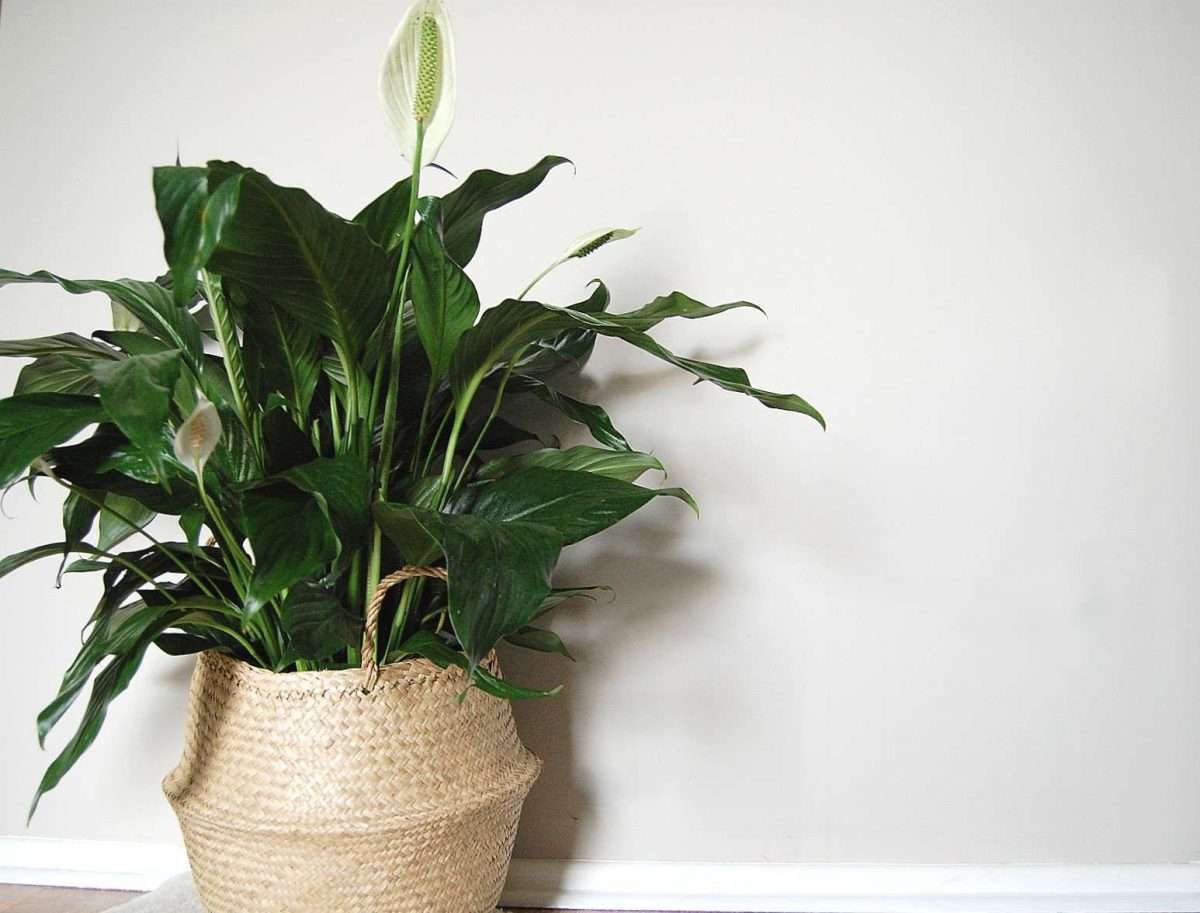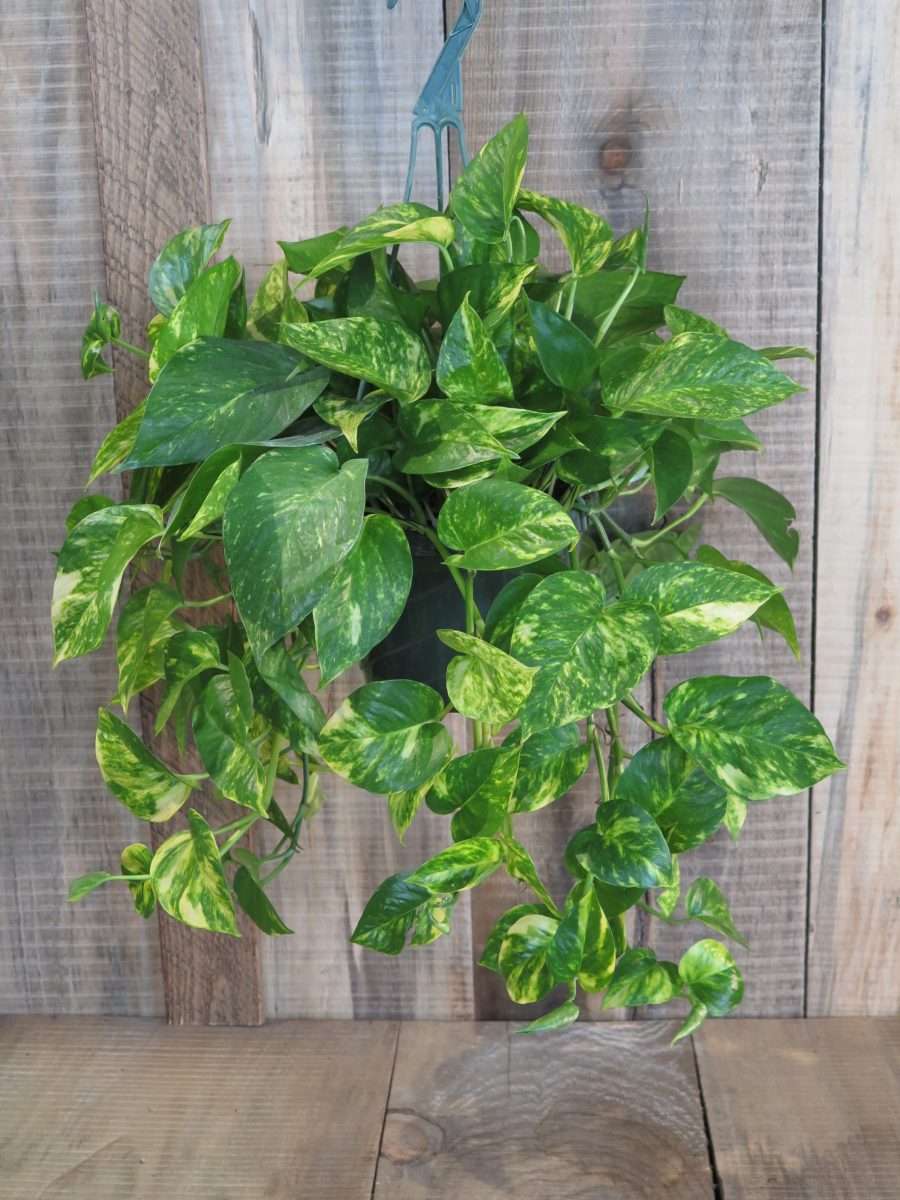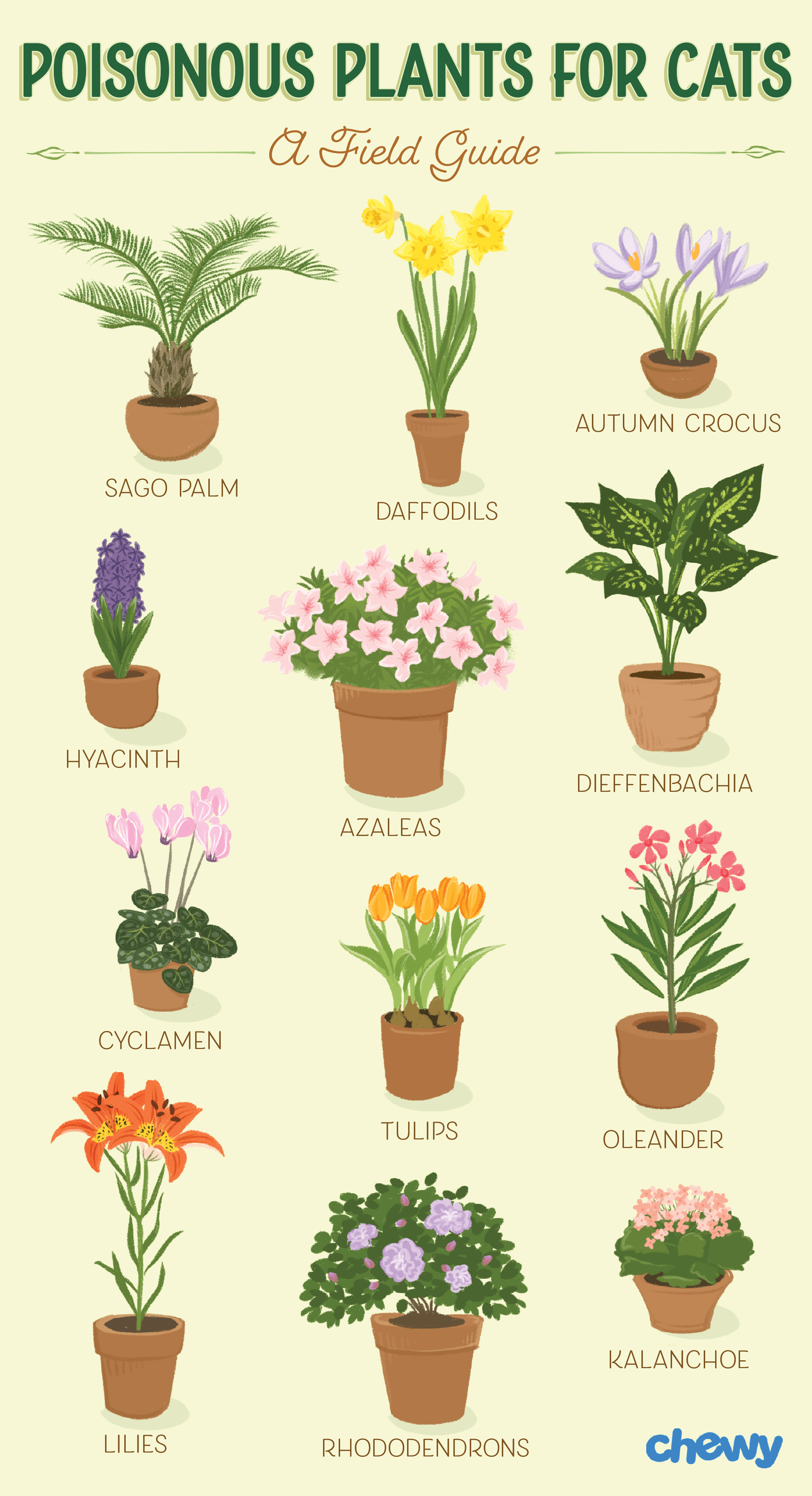What To Do If Your Cat Has Ingested A Poisonous Houseplant
If at any point you suspect your cat has ingested a houseplant, immediately call your veterinarian for evaluation. You may also call the Pet Poison Helpline at 764-7661 for an initial $59 fee.
*Please note that the list above is not exhaustive. If you are unsure whether a plant your pet has eaten is toxic, please call your veterinarian for medical advice.*
Thanks for stopping by! Were glad youre here and hope you learned more about common houseplants that are toxic to cats. If you enjoyed our article, please feel free to share it with friends, family and on social media sites.
Plants That Are Poisonous To Cats
From houseplants to garden plants, including vegetables and herbs, here is just a selection of plants and flowers toxic to cats:
1. Lilies: People tend to use “lily” as an all-encompassing term, but there are about 90 species in all, including the Asiatic lily, Easter lily and lily of the valley. What do they have in common other than a name? They’re all poisonous plants to cats. In fact, they’re one of the most toxic plants for your feline friend ingestion can lead to immediate kidney failure.
2. Eucalyptus: Though rich in fiber, eucalyptus isn’t part of a healthy diet the leaves are toxic to most animals, except koalas and a few wild bird species.
3. Jade: Succulents, like jade, are the perfect option for those who don’t have a green thumb because they’re low-maintenance and beautiful. Unfortunately, jade is also one of several succulents that are poisonous to cats.
4. Milkweed: Planting milkweed in gardens has become a popular way to support monarch butterfly populations. However, the fruit of the milkweed plant is toxic to both wildlife and humans.
5. Onion: Onions are a staple of dinner tables around the globe, especially in China and India, the top two onion-producing countries. But onions, as well as garlic, leeks, scallions, chives and shallots, are toxic to many animals, including cats and dogs.
6. Tomato: The fruit of the tomato is harmless to your kitty, but its stem and leaves can be toxic. Add this to your list of people food not to give your cat.
Feline Stimulants & Hallucinogens
There are also some plants that cats chew on like a drug. Most people are aware of the effects of catnip on cats drooling, playfulness, and utterly bonkers behavior. Its said that the effects are similar to those of marijuana or LSD in humans but will only last about ten minutes. Catnip affects only 50% of cats.
There are a couple of other plants that affect cats in a similar way. These include valerian root, which is grown as a natural sleep aid for people and spider plants. One of my cats doesnt react to catnip but does show interest in Valerian. The other loves both and I sometimes find him chewing on my spider plant too.
Also Check: Why Are Black Cats Unpopular
Symptoms Of Toxic Plant Poisoning In Cats May Include:
- Mental dullness, decreased interaction, or hiding
- Severe irritation or ulceration of the mouth, lips, and tongue: Signs include a cat pawing at their mouth, decreased appetite, gagging, drooling, or bad cat breath
- Difficulty swallowing
- Vomiting
- Stomach pain: Signs that your cat has stomach pain might include decreased appetite, low energy, hiding, vomiting, and a decrease in urination and bowel movements
- Diarrhea
- Excessive drooling
- Changes in urine: This could be a change in color or change in the amount of urine
- Changes in thirst
- Low energy
Common Indoor Plants Toxic To Cats

February 28, 2022// by Britt Kascjak//
Cats can be mischievous creatures, interested in exploring their surroundings and everything in them including your indoor houseplants. Unfortunately, many of the most common indoor plants are toxic to cats. As cat parents, its our responsibility to recognize which plants are putting our cats at risk and take steps to eliminate the danger.
This doesnt mean that you cant bring some much-needed greenery into your home! Studies have found that adding houseplants to your home or workplace offers many benefits including boosting productivity, reducing stress, and improving air quality.
Create a happy, healthy home environment for your cat by trading in the following common plants toxic to cats for cat-friendly alternatives.
Recommended Reading: How Do You Teach A Kitten Not To Bite
Why Do Cats Eat Plants
Before we jump into the list, its important to look into the reasons why your cat may be tempted to snack on your houseplants.
Despite their obligate carnivore status, there are a number of reasons behind why cats eat houseplants. Understanding their behavior is an excellent first step towards providing alternatives and keeping them safe:
Houseplants Toxic To Cats
Cats are curious by nature and love to have a little chew on vegetation from time to time. This would all be fine except that some vegetation is very disagreeable to cats. If you are thinking of bringing a cat into your home or you are someone who loves a bit of greenery and plant life in your home and you have a cat, check out this list of common houseplants toxic to cats. Make sure your cat isnt at risk from these houseplants!
Whilst the below list isnt comprehensive, it does feature some very popular and fashionable house plants that are poisonous to cats. To keep your cat safe, try to avoid having these plants around your home.
Recommended Reading: Bird’s Nest Fern Cats
Houseplants That Are Poisonous To Cats
Bridget ReedMar 16, 2022â12 min read
One of the most frightening moments as a pet parent is when you think that your furry friend got their paws on a product that could be harmful to them.
Unfortunately, accidents happen and pets mistakenly gain access to itemsâplants, food, or otherwiseâthat can prove extremely harmful to their health.
If your cat accidentally consumes the wrong type of plant, it could potentially poison them and lead to drastic emergency situations.
Diligent pet parents must ensure that they are well-versed in plants that could harm their pets. Recognizing and avoiding these plants is an essential part of creating a pet-safe household and yard.
Toxic Plants For Cats Lilies
Before we continue onto the houseplants we need to talk lilies. While there are many plants and flowers that can cause everything from rashes to upset tummies in cats, Lilies are the most fatal.
Though most adult cats will avoid chewing on dangerous leaves and flowers, the pollen can drift down from bouquets and settle on flat surfaces. A cheeky scamper across the dining room table and little furry toes can pick up pollen, which is then licked off when the kitty grooms itself. Lily pollen can kill your beloved feline since the smallest amount will cause acute kidney failure.
Dangerous lilies arent just constrained to bouquet flowers. Peace lilies are a common houseplant that can make your cat sick too. Fortunately, peace lily poisoning doesnt end in acute kidney failure like other lilies.
Don’t Miss: Training Kitten Not To Bite
Staghorn Fern/stags Horn Fern/elk Fern
Easy to identify by its stag antler/moose antler-shaped leaves. Native to Australia, these ferns tend to grow on trees rather than on the ground although if you are shopping for one it is likely to come in a pot. In the wild, these grow to a mighty size, but in a pot or outside its normal environment growth is going to be small and manageable. Very distinctive-looking plants make this a houseplant that is growing in popularity allied to the fact they are reasonably easy to look after.
Light Conditions: Bright indirect light doesnt survive under just artificial light.
Watering: Wont tolerate overwatering likes misting and soaking more light more water. Generally, water once per week.
Symptoms Of Poisoning In Cats
Depending on the plant species that has been ingested, the early signs and symptoms of poisoning can vary greatly.
- Irritants may cause symptoms such as: irritation around the mouth, itchiness, swelling, and red or watery eyes.
- If your cats organs have been effected by ingesting a toxic plant, symptoms of poisoning may include: breathing difficulties, drooling, difficulties swallowing, excessive drinking, frequent urination, overall weakness, or irregular heartbeat.
- Gastrointestinal symptoms of poisoning may include: vomiting and diarrhea.
Don’t Miss: Is Blue Buffalo Wilderness Good For Cats
The Page You Were Looking For Doesnt Exist 404
Author: Shelby DeVore // Last updated on January 28, 2021
It seems like everyone has houseplants these days. This decor trend is well-received since there are many benefits to having houseplants. Not only will houseplants add a pop of color to your home, but theyll also help to keep the air clean and fresh with no effort from you. But what if you have cats?
Remember the phrase curiosity killed the cat. Cats are notoriously curious and may be tempted to take a bite out of your houseplants. Make sure that your houseplants are safe and nontoxic if you have cats in your home. Read on to learn more about a variety of houseplants safe for cats, and those that are toxic as well.
Dont Miss: Hp Lovecraft Name
Plants That Are Toxic For Cats

Many plants are poisonous or toxic to cats and kittens. If you notice your furry friend eating any plant that youre unsure of, call your vet.
Below are just a few of the most common plants that are poisonous for your cat or kitten to eat:
- Spring bulbs
- Tulip
- Yew
While all of the plants listed above are toxic to cats, perhaps the most dangerous is the lily. Lilies can cause kidney failure in cats who come in contact with the flowers pollen, then ingest the pollen during grooming.
If you have cut flowers in the house, including lilies, be sure to keep your flowers in a room where they will not come in contact with your cat.
If you suspect that your cat has come in contact with lilies, contact your Santa Cruz vet as soon as possible.
Dont Miss: Cats Pupils Are Different Sizes
Recommended Reading: Diy Cat In The Hat Shirt
Additional Poisonous Plants I Need To Point Out
There are two more plants I really want to point out. They may not be that common to have indoors, but they may find a way into your house. Im talking about Lilies and Sago palm, and both are extremely toxic to cats.
Most palms that are commonly grown indoors are not toxic to cats, like the Areca palm and Ponytail palm, but the Sago palm is really toxic, it can even cause death. I dont have it in my house and even if my cats wouldnt be attracted to it, I still wouldnt have it!
Lilies are also really toxic to cats. They may not be commonly grown indoors, but they are a really common cut flower that you can easily receive as a gift. So, just be aware of its toxicity if you have a cat at home.
Moderately Poisonous Plants For Cats
Some plants result in more severe poisoning. These include:
- Ivy can cause vomiting, diarrhea, drooling, breathing difficulty, fever and muscle weakness.
- Azalea and rhododendrons can cause vomiting, diarrhea, hyper salivation, weakness, depression of the central nervous system and, in severe cases, death.
- Holly shrubs may result in digestive upset and nervous system depression.
- Norfolk pine causes vomiting, depression, pale gums and low body temperature.
- Euphorbia plants result in mild to moderate digestive upset and excessive salivation.
Read Also: Why Does My Cat Have Bumps On Her Neck
Are My Plants Poisonous 14 Houseplants Poisonous To Cats
- 8 min read
Unlike their omnivorous canine cohorts, cats are carnivores. In fact, according to the ASPCA, cats are obligate carnivores. This means that cats require meat in their diet to survive, specifically the high levels of protein and taurine meat provides. In short, your cat should not be fed a vegetarian or vegan diet. So thenwhy do cats eat houseplants, especially considering the huge number ofhouseplants poisonous to cats?
This question is the bane of green thumbs everywhere! Whether theyre treating your prized peace lily as a litter box or taking a nibble off its beautiful leaves , it can prove to be a frustrating behavior to deal with.
Moreover, it can be dangerous and potentially life-threatening for your feline friends.
, and according to Farmers Almanac,Over 700 indoor/outdoor plants contain toxic substances that are not safe for your dog or cat. While there are simply too manyplants poisonous to cats to go through in a single blog post, we have compiled a list of 14 of the most common poisonous houseplants for cats. Many of these plants also pose a threat to dogs, so be sure to double-check to ensure your best friends safety.
Help My Cat Ate A Poisonous Plant
First things first, dont panic. When we panic, we lose our ability to think and act quickly. Depending on the type and amount of plant your cat ingested, acting quickly may make the difference between recovery and irreversible damage.
Determine which plant your cat has eaten and try to get a rough estimate of how much they may have ingested. For instance, did they just take a bite or is a significant portion of the plant gone? Be sure to take a sample of the plant for your veterinarian.
Next, call your vet or the ASPCA Pet Poison Control Center Hotline. This hotline is available 24 hours a day, 365 days a year, and will have information vital to your pets health.
Read Also: How Fast Should A Cat’s Heart Rate Be
First Aid For Poisoned Cats
As well as hazardous plants and flowers, there are items around the house that can cause poisoning in cats. If you can see the poisonous substance, take your cat away from it and call your vet for advice. They may want to see your cat immediately. Making your cat sick may not be helpful.
If you have evidence of what your cat has eaten, take a sample to the vet. Even a sample of vomit may help diagnosis, particularly if it is an unusual colour or contains plant matter.
Most importantly, don’t panic. Seek advice from your vet immediately and they’ll be able to help.
What Makes A Plant Toxic To Cats
There is a number of substances found in plants that are toxic to cats. Some of them are present in all areas of the flower, while others are only in the stems or roots. Well talk about the main ones here before we get to your burning, what houseplants are not poisonous to cats question. Deal? Great, lets jump into the details.
Don’t Miss: Savannah Mix Cat
How Do You Keep Cats Away From Houseplants
The short answer here is that its unlikely you can convince your cat to leave your plants alone. The urge to dissuade kitty from targeting your plants is an understandable one. But that may not be the best approach for your cat. First of all, playfully batting at fronds and leaves, pawing at the dirt, and biting off stems satisfies your cats instincts to play, dig, explore and chew. Plus, while there are tricks you can try, theres no such thing as a foolproof method that teaches cats to keep their distance from plants.
That brings us to toxic plants. While many houseplants dont hurt cats when eaten, there are plenty that do. You cant count on feline senses to tell between a safe plant and toxic plant. Our houseplants come from almost all continents, lands far from early ancestors of domestic cats. How would they know?
So heres the solution: If a plant is deemed toxic, or is causing stomach upset and other signs of distress, why take a gamble on your cats health while attempting to change his behavior? Keep the plant in a room that your cat cant enter, or rehome the plant to a pet-free house. Its best for kittys health, and youll feel less stressed.
Lilies Very Toxic Plant For Cats

Lilies are very popular around the world they are usually seen around borders, garden beds, and bouquets. Although their flowers are beautiful and smell nice, they pose a great threat to cats safety.
Cats are usually drawn to the beautiful bouquet of daylilies on a dining table or the colorful array of daylilies in the garden. But lilies are very toxic plants for cats.
The whole lily plant is poisonous: the leaves, the stem, the flowers, the pollen, and even the water in the vase.
Eating a little amount of lily leaf, flower petal, or licking some pollen from its fur while grooming or drinking from the vase can cause your cat to develop fatal kidney failure within few days.
Peace lilies, Calla lilies, Peruvians lilies contain oxalate crystals that cause minor symptoms, like an irritation to the tongue, mouth, esophagus, and pharynx, causing slight drooling.
The most dangerous lilies are true lilies, and these include Asiatic lilies, tiger lilies, Asian lilies, Daylilies, Easter lilies, and Japanese show lilies, all of which are very toxic Plants for Cats.
Even small ingestion of 2-3 leaves can lead to acute kidney failure. If you noticed your cat consuming any portion of lily, consult your veterinarian immediately for medical care
Also Check: Cat Foot Swollen